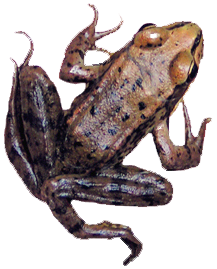The unusually frigid winter continues in the Northwest and the frogs are showing signs that even their endless patience has its limits. From the end of November through January the temperature’s been hovering around freezing, diving well below at night. An exclamation point was added the night of January 10 when -- in a place where a 6 inch show fall is unusual -- 16 inches fell in a few hours. (The show was accompanied by lightning for good measure!) Since the tiny migrational pulse of November 14, we didn’t see a single frog till January 21, when, apparently in solidarity with the Woman’s March, they made a fair showing, most of their signs yelling about the coming evisceration of the EPA, though the frog’s activism was of the strong, silent variety.) On the 21st it was 40 degrees at dusk, in our experience too cold for movement, and I headed for the local watering hole for dinner and beer, not necessarily in that order, running into friends intent on political rabble rousing.
Unbeknownst to me the temp had risen to 45 (the threshold for movement) by 7pm, the air just misty enough to invite the little guys out. Jane and her husband Mark, seeing the temperature in their car, checked Harborton on their way home from dinner, encountered a gaggle of frogs and the call went out for help. The feathers were flying at the bar, and my phone has a sneaky habit of turning the ring tone off, so when the phones vibrations on my leg finally pierced the partisan cacophony I’d racked up four messages. I dashed out leaving a full beer on the table. The mile and a half to Harborton was quick, I leaned the bike against the guardrail, got the box with the headlamps and assorted frog equipment from my house, and joined the dedicated souls who’d answered the frantic calls. It was almost immediately pleasant to be out there catching frogs again with the frog folks; it had been awhile. We caught 88 males and 17 females over that three hours as the temperature dropped below what we thought was the low threshold of 43 degrees. By 10pm the temp had dropped to 39 and even then a little male ventured out onto the road. The frogs were leaving the relative warmth of deep duff up in the forest, braving the cold, dry conditions, and the threat of sudden murder, in the hope of lounging in the icy water of the wetland to spoon frog-style and generate legends of earnest pollywogs.
Since January 21 the cold has resumed and the frogs wait. On two subsequent nights that were both dry and in the low 40s Shawn found a handful hopping out into the roadway anyway, their determination palpable. Cold winters aren’t unheard of in this vicinity; the Willamette River froze over in 1979, the Columbia itself froze solid in 1930 (and so much colder then the present), and of course the frogs lived here through the ice ages that ended some 10,000 years ago, so for such resilient creatures a single cold winter is simply a time to hunker down and wait for the warm, wet night that will surely come. The larger problem for them is the Anthropocene, and its relentless pressure for endless growth; winning, so much winning as to be tired of always winning..
The forest where the frogs live, and the Willamette River's confluence with the Columbia, an industrial area on the right, Sauvie Island on the left, and Washington State in the distance.

